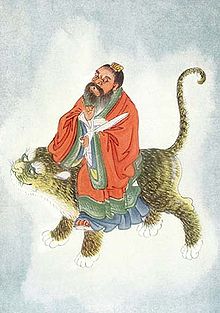- Zhang Daoling
-
For other people named Zhang Ling, see Zhang Ling (disambiguation).
Zhang Daoling 
Zhang Daoling as pictured in
Myths and Legends of China
by E. T. C. WernerBorn 34 Died 156 (aged 121–122) Occupation Founder of Way of the Five Pecks of Rice Zhang Ling (simplified Chinese: 张陵; traditional Chinese: 張陵; pinyin: Zhāng Líng; Wade–Giles: Chang Ling; 34–156), style name Fuhan (simplified Chinese: 辅汉; traditional Chinese: 輔漢), was an Eastern Han Dynasty Taoist hermit who founded the Way of the Celestial Masters sect of Taoism, which is also known as the Way of the Five Pecks of Rice.
He is also known as Zhang Daoling (simplified Chinese: 张道陵; traditional Chinese: 張道陵; pinyin: Zhāng Dàolíng; Wade–Giles: Chang Tao-ling), Celestial Master Zhang (張天師), Ancestral Celestial Master (祖天師) or Zhengyi Zhenren (正一真人) to Taoists. Zhang is sometimes pictured riding on a tiger. In some Taoist sects, Zhang, along with Ge Xuan, Xu Xun and Sa Shoujian, are called the "Four Celestial Masters" (四大天師).
Biography
Taoism 
This article is part of a series on TaoismFundamentals Dao (Tao) · De (Te) · Wuji · Taiji · Yin-Yang · Wu Xing · Qi · Neidan · Wu wei Texts Laozi (Tao Te Ching) · Zhuangzi · Liezi · Daozang Deities Three Pure Ones · Guan Shengdi · Eight Immortals · Yellow Emperor · Xiwangmu · Jade Emperor · Chang'e · Other deities People Laozi · Zhuangzi · Zhang Daoling · Zhang Jue · Ge Hong · Chen Tuan Schools Tianshi Dao · Shangqing · Lingbao · Quanzhen Dao · Zhengyi Dao · Wuliupai Sacred sites Grotto-heavens · Mount Penglai
Taoism Portal
Zhang traced his ancestral home to Feng County, Jiangsu, and was said to be a descendant of Zhang Liang. He was born in the tenth year of the Jianwu era during the reign of Emperor Guangwu of Han. He started reading the Tao Te Ching at a young age and studied in the Taixue (Imperial Academy) before. He served as a magistrate in Jiangzhou, Ba Commandery (present-day Chongqing) during the reign of Emperor Ming of Han.
Zhang later retired and led a reclusive life at Mount Beimang, where he practiced ways of achieving longevity. When invited to serve as a boshi (equivalent of a present-day professor) in the Imperial Academy, he claimed that he was ill. Emperor He of Han summoned him thrice to serve as the Taifu (Imperial Tutor) but he refused again.
According to tradition, in 142, Laozi appeared to Zhang on Mount Heming, and informed the hermit that the world was coming to an end, to be followed by an era of Great Peace. Laozi explained that those following him would go on to another life, part of the "Orthodox One Covenant with the Powers". Through this covenant, Zhang and his followers would have access to the assistance of celestial powers who control the fate of mankind.
Zhang went on to found the first regular Taoist community as noted above. A major change instituted by the new Covenant was the rejection of food and animal sacrifices. Also, the teachings of Laozi as transmitted by Zhang included the first true Taoist religious pantheon as distinguished from the prior ancient religion of China. Zhang also wrote a 24 volume Taoist classic, said to be the Xiang'er, a commentary to the Tao Te Ching.
Zhang died on Mount Qingcheng in 156 during the reign of Emperor Huan of Han at the age of 123. However, it is also said that Zhang did not die. Instead, he ascended to Heaven with his wife and two disciples, and became an immortal.
See also
- Way of the Five Pecks of Rice
- Way of the Celestial Masters
Categories:- 34 births
- 156 deaths
- Chinese centenarians
- Chinese hermits
- Han Dynasty Taoists
- Taoist religious leaders
- Way of the Celestial Masters
Wikimedia Foundation. 2010.
